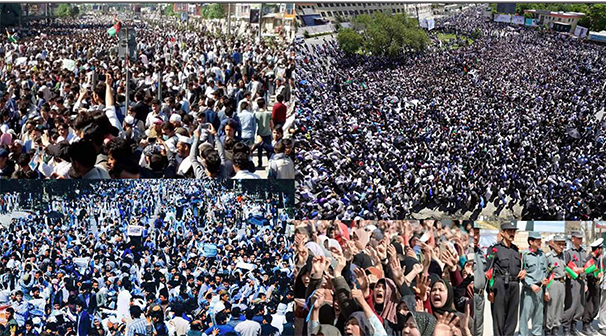In democratic systems, discrimination on the grounds of race, sex, color or creed is not acceptable. All individuals are entitled to exercise their rights and dignity without barriers. Their natural and inalienable rights, bestowed by the Creator, are inviolable. And “government of the people, for the people and by the people” will leave no room for curtailing the public freedom and violating their human rights.
A constitution which is approved by people’s representatives based on international criteria, i.e. recognizing the citizens’ basic rights namely the rights to life, liberty and property without distinction or discrimination, will nurture one’s hope for stronger democracy. Citizens are supposed to be treated equally in the eye of law regardless of their social or political status. Segregating a minority group from the main body of society or simply from social services, etc. will be a slap in the face of democracy and put the entire government under question. In such a case, since freedom of speech and freedom of assembly are remarkable elements in a democratic administration, the segregated individuals can voice their concerns, individually or through forming an assembly, for their rights.
With the downfall of the Taliban’s regime, Afghanistan took significant steps towards democratization. Establishing Constitution based on international standards, conducting elections and founding parliament, which is considered the beating heart of democracy, are the milestones in the post-Taliban Afghanistan. Constitutionally, the government is committed to form a violent-free society, wherein citizens will be able to exercise their civil rights without violence and bloodshed, support the public rights and freedom, strengthen national unity and regain the Afghanistan’s position in the international level through demonstrating democracy via fighting against injustice, cruelty, corruption, lawlessness, etc. As a result, the Constitution, which was approved in January 2004, states in article 6 as, “The state shall be obligated to create a prosperous and progressive society based on social justice, preservation of human dignity, protection of human rights, realization of democracy, attainment of national unity as well as equality between all peoples and tribes and balance development of all areas of the country.”
However, despite having an immaculate constitution and establishing a democratic state, people’s rights and liberty are challenged in one way or another. In other words, although Afghanistan achieved greatly following the Taliban’s dictatorial regime, there are a lot to be done. People are still the casualty of discrimination and injustice. The relentless corruption in government’s machinery has paralyzed the democratic values and the individuals are judged based on their social and political status rather than provisions of law. To put it in another item, the words of law and social practices in daily life go into two different directions. After all, it is really disappointing to see that law is violated more by the individuals who claim to be law enforcement personnel. For instance, the corruption in judicial system and among the police is uncontrollable and sucks the blood of ordinary people. Who dare open his/her lips?
Democracy is under a serious doubt in Afghanistan, mainly when one notices in national and international papers that this country is still at the top of most corrupt countries, the most unlucky place for women and children, the largest opium producer, etc. It is believed that simply boasting about ideal human rights, freedom and dignity articulated in the constitution will not reflect democracy but how much the law is enforced and to what extent people are able to exercise their rights and liberty under the state’s support. It is right that presidential and parliamentary elections were conducted in Afghanistan, but how was the transparency level in the election? Do you not think that the legal period of the current parliament is over and it is operating no more on the basis of law? I will not mention streams of blood being spilt almost every day by the militant groups; I simply talk about legal challenges which threaten our social life. If one justifies the security problems through a thousand and one reasons brought by officials such as three decades of war, the interference of neighboring countries, etc. s/he will never justify the corruption, which is the root of many other challenges, going on in government’s machinery. The widely undemocratic practices in collective life, lack of law enforcement, discriminatory treatments, etc. will demonstrate the administration undemocratic.
As article 6, mentioned above, articulates the state’s responsibility, which one of those obligations is fulfilled up to now? Protecting human rights? Forming a prosperous and progressing society? Strengthening national unity? What about the presidential agenda which made the mouth of the audience water during the campaigns? Afghanistan’s economy was supposed to develop on a large scale, as stated in the agenda, and the nation was to enjoy a prosperous life.
Home » Opinion » Obstacles before Democracy
Obstacles before Democracy
| Hujjatullah Zia

